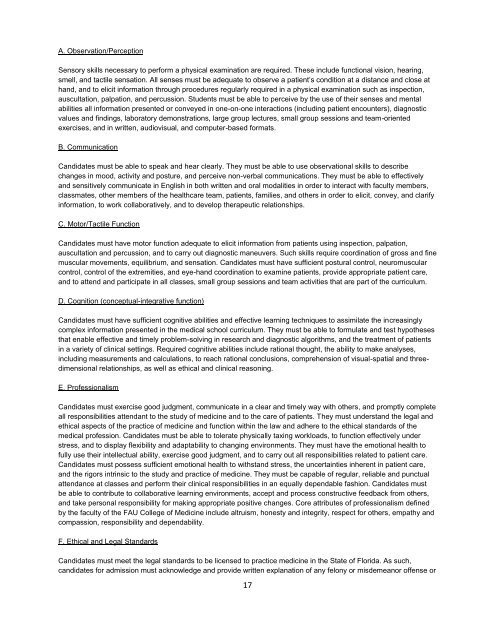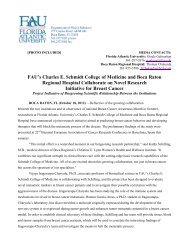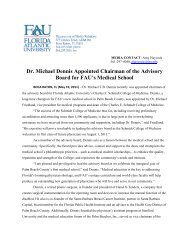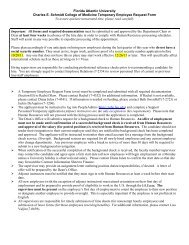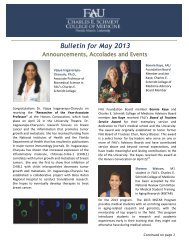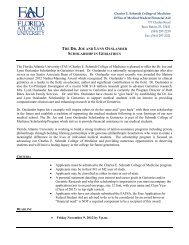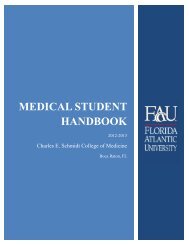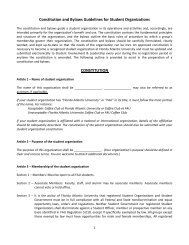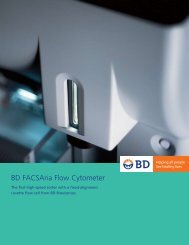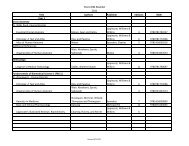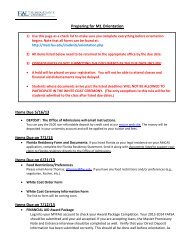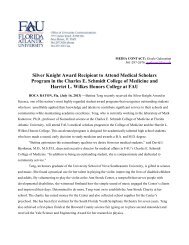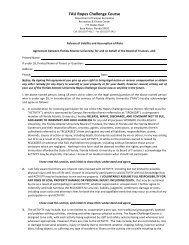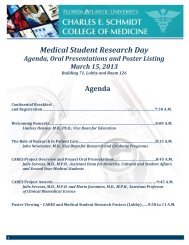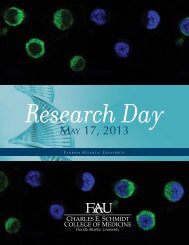Student Handbook - College of Medicine - Florida Atlantic University
Student Handbook - College of Medicine - Florida Atlantic University
Student Handbook - College of Medicine - Florida Atlantic University
Create successful ePaper yourself
Turn your PDF publications into a flip-book with our unique Google optimized e-Paper software.
A. Observation/PerceptionSensory skills necessary to perform a physical examination are required. These include functional vision, hearing,smell, and tactile sensation. All senses must be adequate to observe a patient’s condition at a distance and close athand, and to elicit information through procedures regularly required in a physical examination such as inspection,auscultation, palpation, and percussion. <strong>Student</strong>s must be able to perceive by the use <strong>of</strong> their senses and mentalabilities all information presented or conveyed in one-on-one interactions (including patient encounters), diagnosticvalues and findings, laboratory demonstrations, large group lectures, small group sessions and team-orientedexercises, and in written, audiovisual, and computer-based formats.B. CommunicationCandidates must be able to speak and hear clearly. They must be able to use observational skills to describechanges in mood, activity and posture, and perceive non-verbal communications. They must be able to effectivelyand sensitively communicate in English in both written and oral modalities in order to interact with faculty members,classmates, other members <strong>of</strong> the healthcare team, patients, families, and others in order to elicit, convey, and clarifyinformation, to work collaboratively, and to develop therapeutic relationships.C. Motor/Tactile FunctionCandidates must have motor function adequate to elicit information from patients using inspection, palpation,auscultation and percussion, and to carry out diagnostic maneuvers. Such skills require coordination <strong>of</strong> gross and finemuscular movements, equilibrium, and sensation. Candidates must have sufficient postural control, neuromuscularcontrol, control <strong>of</strong> the extremities, and eye-hand coordination to examine patients, provide appropriate patient care,and to attend and participate in all classes, small group sessions and team activities that are part <strong>of</strong> the curriculum.D. Cognition (conceptual-integrative function)Candidates must have sufficient cognitive abilities and effective learning techniques to assimilate the increasinglycomplex information presented in the medical school curriculum. They must be able to formulate and test hypothesesthat enable effective and timely problem-solving in research and diagnostic algorithms, and the treatment <strong>of</strong> patientsin a variety <strong>of</strong> clinical settings. Required cognitive abilities include rational thought, the ability to make analyses,including measurements and calculations, to reach rational conclusions, comprehension <strong>of</strong> visual-spatial and threedimensionalrelationships, as well as ethical and clinical reasoning.E. Pr<strong>of</strong>essionalismCandidates must exercise good judgment, communicate in a clear and timely way with others, and promptly completeall responsibilities attendant to the study <strong>of</strong> medicine and to the care <strong>of</strong> patients. They must understand the legal andethical aspects <strong>of</strong> the practice <strong>of</strong> medicine and function within the law and adhere to the ethical standards <strong>of</strong> themedical pr<strong>of</strong>ession. Candidates must be able to tolerate physically taxing workloads, to function effectively understress, and to display flexibility and adaptability to changing environments. They must have the emotional health t<strong>of</strong>ully use their intellectual ability, exercise good judgment, and to carry out all responsibilities related to patient care.Candidates must possess sufficient emotional health to withstand stress, the uncertainties inherent in patient care,and the rigors intrinsic to the study and practice <strong>of</strong> medicine. They must be capable <strong>of</strong> regular, reliable and punctualattendance at classes and perform their clinical responsibilities in an equally dependable fashion. Candidates mustbe able to contribute to collaborative learning environments, accept and process constructive feedback from others,and take personal responsibility for making appropriate positive changes. Core attributes <strong>of</strong> pr<strong>of</strong>essionalism definedby the faculty <strong>of</strong> the FAU <strong>College</strong> <strong>of</strong> <strong>Medicine</strong> include altruism, honesty and integrity, respect for others, empathy andcompassion, responsibility and dependability.F. Ethical and Legal StandardsCandidates must meet the legal standards to be licensed to practice medicine in the State <strong>of</strong> <strong>Florida</strong>. As such,candidates for admission must acknowledge and provide written explanation <strong>of</strong> any felony or misdemeanor <strong>of</strong>fense or17


